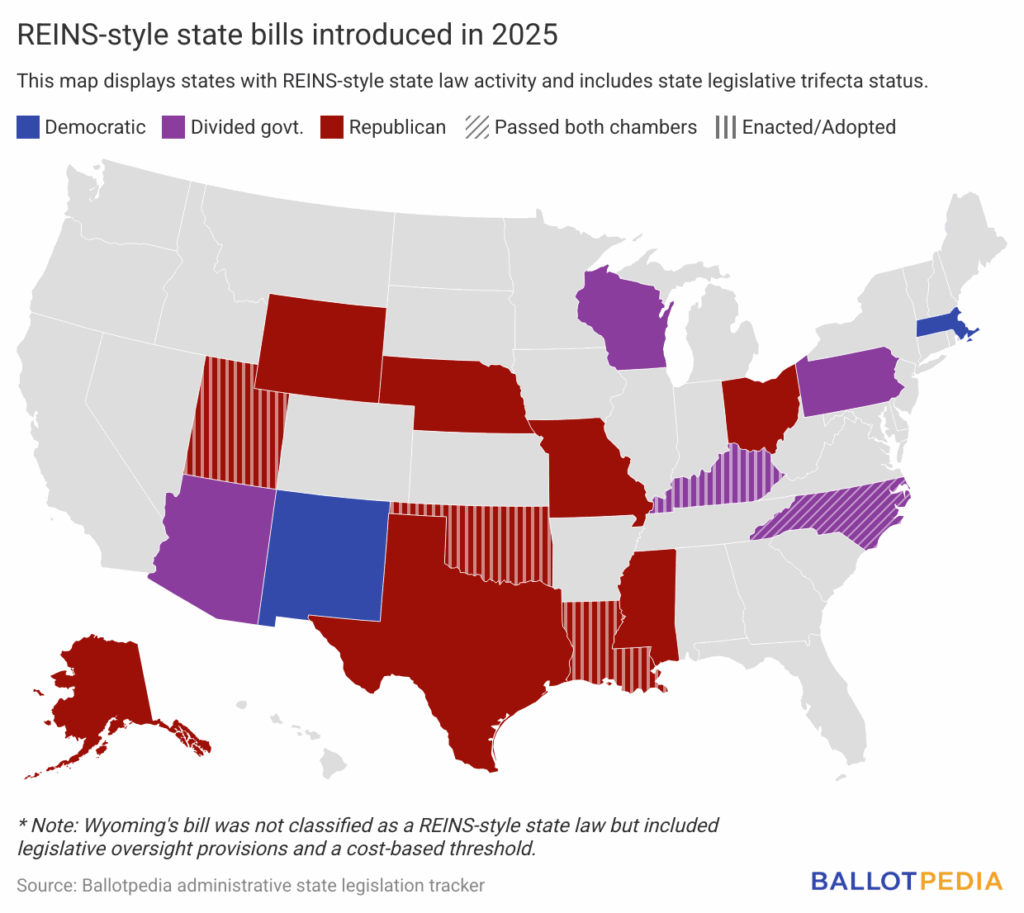What’s the story?
North Carolina Gov. Josh Stein (D) vetoed House Bill 402, titled Limit Rules With Substantial Financial Costs, on June 27. HB 402 was designed to create legislative approval and agency board supermajority vote requirements for new agency rules with costs above stated thresholds. HB 402 now returns to the legislature, where both houses may consider an override.
Governor Stein stated in his veto message, "This bill would make it harder for the state to keep people’s drinking water clean from PFAS and other dangerous chemicals, their air free from toxic pollutants, and their health care facilities providing high quality care. It would impose red tape, including an unworkable unanimity requirement, that would hamstring the decision-making of agencies, boards, and commissions, making them less effective at protecting people’s health, safety, and welfare."
HB 402 sponsor Rep. Allen Chesser (R) said, “What we are trying to do is create a layer of accountability for the people who are affected by the rules and give them someone to hold accountable…I personally believe that should be us, their elected representatives, not an appointed bureaucratic board that they have no control or no power over.”
HB 402 passed the Senate by a party-line vote of 26-17 on June 10, 2025, with all Republicans in support and all Democrats in opposition. The House voted 70-44 on June 17, 2025, with 67 Republicans and three Democrats voting in support; no Republicans and 44 Democrats voted in opposition. Four Republicans and two Democrats were absent.
Why does it matter?
HB 402 requires legislative approval before the implementation of proposed regulations with an estimated financial cost of $20 million or more over five years, except for rules mandated by federal law. HB 402 was previously named the NC REINS Act, with REINS standing for Regulations from the Executive in Need of Scrutiny.
HB 402 also requires agencies to prepare a detailed fiscal note for each regulation, including baseline comparisons, direct and opportunity costs, and net present value calculations of the costs using a discount factor of seven percent. Under the bill, regulations that cost between $1 million and $10 million over five years would require a two-thirds vote of approval from the board of the rulemaking agency; those with a cost greater than $10 million would require the board’s unanimous approval.
What’s the background?
A veto override in North Carolina requires a three-fifths supermajority vote in both chambers, which is 72 votes in the House and 30 votes in the Senate. The legislature overrode all 27 vetoes by former Gov. Roy Cooper (D) in 2024.
The House had a Republican supermajority from April 2023 to January 2025. Republicans gained their veto-proof supermajority in the House when Rep. Tricia Cotham (D) switched parties from Democratic to Republican in 2023, giving Republicans 72 seats out of 120. Republicans gained a veto-proof supermajority in the Senate in the 2022 election, going from 28 to 30 seats out of 50.
In the November 2024 elections, Republicans lost one vacant seat in the House, which ended their supermajority. Without it in 2025, any veto override attempt will require support from at least one House Democrat. Three House Democrats—Reps. Cecil Brockman, Carla Cunningham, and Shelly Willingham—voted in favor of HB 402. Republicans retained control of 30 Senate seats in the 2024 elections.
REINS and administrative state legislation in NC
In North Carolina’s 2025 legislative session, 36 bills related to the administrative state have been introduced as of June 24. Of these bills, only HB 402 had passed both chambers as of June 24.
The initial version of HB 402, as introduced, would have made any regulation with an economic impact of $1 million or more over 12 months subject to a legislative disapproval process under which any legislator could have introduced a bill to disapprove the regulation. The bill was amended to create the requirement for legislative ratification of rules estimated to cost $20 million or more over five years and to put in place the agency majority requirements of the final bill version described above. The initial version also had provisions requiring independent judgment by administrative law judges (ALJs) and superior court judges, but those provisions were removed through amendments.
State REINS-style laws in 2025
Ballotpedia tracks legislation such as NC HB 402 as part of our analysis of the administrative state. REINS-style state laws are a type of legislative oversight over agency rules. It falls in Ballotpedia’s legislative control pillar, which focuses on the balance of power between administrative agencies and the legislative branch. The legislative control pillar is one of the five pillars Ballotpedia uses to understand the administrative state.
In 2025, Ballotpedia is tracking 27 REINS-style bills or other bills increasing legislative oversight based on an economic impact threshold in 17 states. Five states have enacted these bills in 2025 so far: Kentucky, Utah, Oklahoma, Louisiana, and Wyoming. Two states enacted similar bills in 2024.
On March 27, both chambers of the Kentucky General Assembly voted to override Gov. Andy Beshear’s (D) veto of House Bill 6, the REINS-style bill in Kentucky. Because of an emergency clause, HB 6 went into immediate effect. Beshear then filed suit on March 28 to block it.
The Wyoming Legislature overrode Governor Mark Gordon's (R) veto of Wyoming Senate File (SF) 0127 on March 6, 2025, after Gordon’s March 4 veto.
The map below displays REINS-style state bills in 2025.

Want to go deeper?



